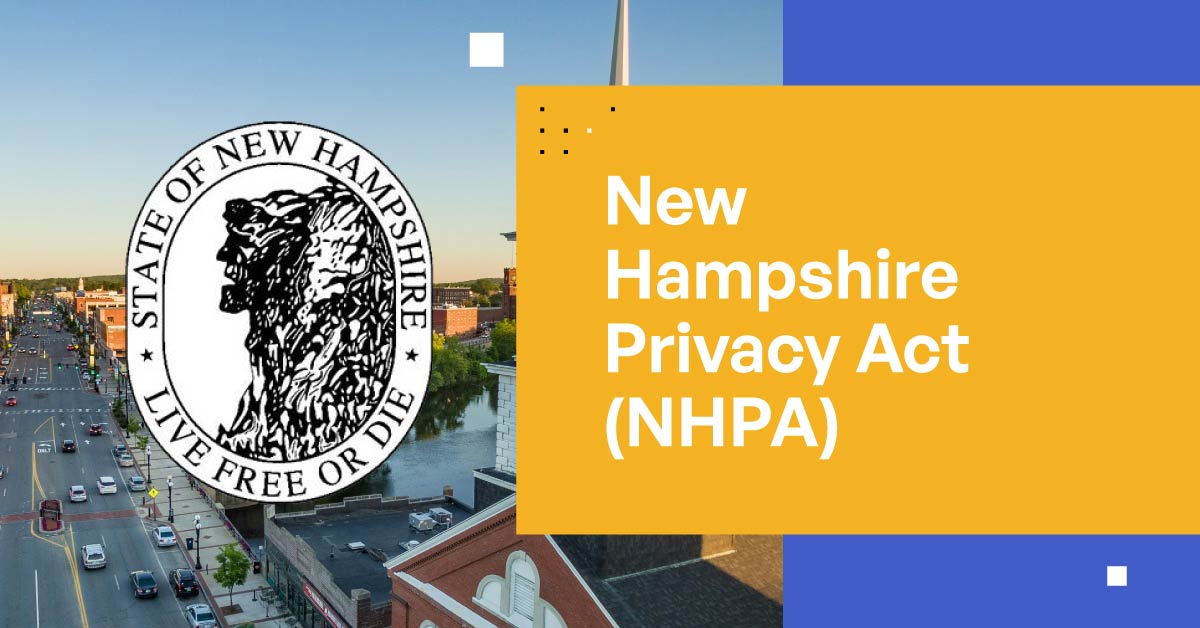Everything You Need to Know About the New Hampshire Privacy Act
In light of an increasing amount of personally identifiable information (PII) being processed, stored, and shared online, combined with the growing threat of cyberattacks, data breaches, and non–compliance penalties, the importance of data privacy and security has become critical. The New Hampshire Privacy Act (NHPA), signed on March 6, 2024, represents a significant legislative effort aimed at safeguarding citizens’ personal information. The NHPA establishes comprehensive data privacy requirements, including the obligations of businesses and the rights of consumers.
This guide provides an overview of the New Hampshire Privacy Act, its implications for businesses, and the benefits it extends to consumers.

Origin of the New Hampshire Privacy Act
The New Hampshire Privacy Act emerged from a growing need for enhanced data protection amid increasing cybersecurity threats, the expansive collection of personal information by businesses, and the global movement towards strengthening individual privacy rights. The NHPA provides a robust legal framework, emphasizing the need for businesses to adopt stringent data management and protection practices for New Hampshire’s citizens.
Structure of the New Hampshire Privacy Act
At the heart of the NHPA are data privacy requirements in NH that mandate businesses to implement reasonable security measures, ensure transparency in their data collection and processing activities, and provide individuals with control over their personal information. This includes requirements for data breach notifications, consumer rights to access, correct, and delete their personal data, and restrictions on the sale of personal information without explicit consent.
Key elements of the New Hampshire Privacy Act include its broad definition of personal information, encompassing a wide range of data types that could potentially identify an individual. These data types include, but are not limited to:
- Full Name: The complete legal name of an individual is protected under the New Hampshire Data Privacy Act to ensure personal identification security
- Social Security Number: This critical piece of personal information is safeguarded to prevent identity theft and fraud, aligning with NH data privacy enforcement standards.
- Driver’s License Number: As a unique identifier, driver’s license numbers are protected to comply with New Hampshire data privacy compliance requirements.
- Email Address: Email addresses are considered private information, securing communication privacy in adherence to data privacy requirements in NH.
- Home Address: The protection of home addresses ensures individuals’ physical privacy, a key aspect of complying with NH data privacy regulations.
- Financial Account Numbers: Bank account, credit/debit card numbers, and other financial details are secured to prevent financial fraud, reflecting the act’s focus on thorough personal information protection.
- Medical Information: Health records and related personal medical information are confidential, emphasizing the importance of health privacy in NH’s legal framework.
- Biometric Data: Information derived from physical characteristics, such as fingerprints, is carefully protected under the act, showcasing the broad scope of NH data privacy protections.
- Internet Activity: This includes browsing history and search history, safeguarding individuals’ online privacy and reflecting the comprehensive approach to data privacy in NH.
This expansive approach ensures that the act remains applicable across various industries and technological contexts. Additionally, the NHPA outlines specific obligations for data controllers and processors, emphasizing accountability and the implementation of privacy–by–design principles in their operations. These elements collectively form the backbone of the act, guiding businesses towards compliance and fostering a culture of privacy and security within the state.
Data Protection Assessments According to the NH Data Privacy Law
The NH Data Privacy Law introduces rigorous standards for data protection. Organizations must conduct thorough data protection assessments, ensuring their practices align with the stringent privacy regulations set forth, thereby safeguarding personal information against unauthorized access and misuse.
These assessments require organizations to evaluate their data handling practices and identify any potential vulnerabilities that could lead to unauthorized access or breaches. For example, companies might need to assess their data encryption methods, data access controls, and incident response plans.
In addition, conducting regular privacy impact assessments ensures that their data collection and processing activities are in line with the NH Data Privacy Act’s provisions. A privacy impact assessment (PIA) is a critical compliance tool that helps organizations evaluate how personal data is managed, ensuring adherence to the New Hampshire Data Privacy Act and other state data privacy laws. For example, a business planning to launch a new app would conduct a PIA to review how customer information is collected, stored, and shared. By identifying risks or gaps early, companies can mitigate potential non-compliance issues and safeguard against data breaches.
Compliance also involves regular reviews of third-party service providers who handle New Hampsherites’ personal data on behalf of the company. This ensures that these partners also adhere to the stringent data privacy requirements in the NH Data Privacy Law.
How Citizens Benefit From the New Hampshire Privacy Act
The New Hampshire Privacy Act provides significant benefits to consumers who live in the state, affirming their rights to privacy and control over their personal information. By granting individuals the right to access, correct, delete, and restrict the processing of their data, the NHPA empowers citizens to take charge of their privacy. This increased transparency and control not only enhances consumer trust in digital ecosystems but also promotes greater awareness of privacy rights and the importance of protecting personal information.
In addition, the act’s provisions for data breach notifications ensure that consumers are promptly informed in the event of a security incident that may impact their personal information. This timely communication enables individuals to take necessary precautions to protect themselves from potential harm, such as identity theft or fraud. The NHPA, therefore, plays a pivotal role in safeguarding the privacy and security of New Hampshire residents in the digital age, fostering a more secure and trustworthy digital environment.
NHPA Compliance Requirements
Adhering to the New Hampshire Privacy Act is crucial for businesses operating within the state, even if they aren’t physically incorporated or domiciled in the state. The act mandates that entities collecting or processing personal information of state residents establish comprehensive data protection and privacy measures. This involves the implementation of reasonable security protocols, transparent data processing activities, and guaranteeing individual rights over their personal data. The act specifies that businesses must also be prepared to conduct data breach notifications in a timely manner, keeping impacted individuals informed and reducing potential harm.
Failure to comply with the NH Data Privacy Act can have significant consequences for businesses. Beyond the immediate financial penalties, non–compliance can lead to severe litigation and reputational risks. Businesses, for example, may face lawsuits, regulatory scrutiny, and a loss of consumer trust, which can be far more damaging in the long run. Ultimately, compliance is not merely a regulatory requirement but a vital component of business strategy, particularly as it pertains to building a culture of data privacy and data protection.
NH Data Privacy Enforcement
Enforcing the New Hampshire Data Privacy Act is essential for safeguarding residents’ personal information. Businesses operating in New Hampshire must ensure they are fully compliant with the act’s requirements to avoid the risk of hefty penalties and damage to their reputation.
The Attorney General’s Office in New Hampshire is entrusted with the enforcement of the NH Data Privacy Act. This responsibility includes investigating complaints, conducting audits, and ensuring that entities doing business within the state and with the state’s residents comply with the law’s provisions. The enforcement actions are aimed at maintaining a high standard of data privacy and protection for residents.
In the event that a business is found to be non-compliant, various penalties can be imposed. These can range from financial penalties, which could amount to significant sums depending on the severity and nature of the violation, to injunctions or even orders to halt certain data processing activities. The precise penalties are assessed based on factors such as the extent of harm caused by non-compliance, the nature of the data involved, and whether the violation was intentional or due to negligence.
NHPA Challenges and Future Directions
The NHPA will need to adapt to ever evolving cyberthreats if it hopes to stay relevant and effective in protecting residents’ personal information. Adaptability and relevance necessitates regular reviews and amendments to the act, ensuring that it remains aligned with current technological realities and cybersecurity threats.
Looking ahead, the New Hampshire Privacy Act will also need to address emerging challenges related to data privacy, such as the implications of AI risk, machine learning, and the Internet of Things (IoT). These technologies introduce new complexities in data collection, processing, and security, requiring updates and refinements to the legislation. Staying ahead of these trends and ensuring that the law’s data privacy enforcement mechanisms are robust will be critical.
Implementing the New Hampshire Data Privacy Act: Best Practices
If organizations wish to protect New Hampshirites’ privacy and comply with the NHPA, they should first adopt a proactive approach to data privacy and security. This includes conducting regular audits to understand what personal information is collected, how it is used, and where it is stored. Businesses should also invest in staff security awareness training programs to ensure that all employees understand their roles in protecting PII and are aware of the data privacy practices required under the NHPA. Additionally, adopting privacy-by-design (PbD) principles, in which data privacy measures are integrated into the development process of new products and services, can help organizations stay compliant while also fostering innovation.
For widespread adoption and success, engagement and collaboration between businesses, consumers, and regulators are essential. Public awareness campaigns can educate consumers about their rights under the act, enhancing their trust in the companies that handle their PII. Lastly, regularly updated guidance from regulators can help businesses navigate the complexities of compliance with NHPA and other regulatory compliance requirements, ensuring that data privacy safeguards are effectively implemented.
Kiteworks Helps Organizations Protect PII in Compliance with the New Hampshire Privacy Act
The New Hampshire Privacy Act is a pivotal piece of legislation that underscores the state’s commitment to protecting the personal information of its residents. By establishing stringent data privacy requirements, the act not only aims to deter data breaches and misuse of personal information but also fosters a culture of privacy and security that benefits both organizations and consumers.
As technology and cyber threats evolve, however, so too must the NHPA. Businesses operating in New Hampshire must remain vigilant, adopting best practices for compliance and staying abreast of any changes to the act. Ultimately, the success of the New Hampshire Privacy Act in safeguarding data privacy will depend on the collective efforts of all stakeholders to adapt, innovate, and collaborate in the face of new challenges.
With Kiteworks, businesses utilize Kiteworks to share confidential personally identifiable and protected health information (PII/PHI), customer records, financial information, and other sensitive content with colleagues, clients, or external partners. Because they use Kiteworks, they know their sensitive data and priceless intellectual property remains confidential and is shared in compliance with relevant regulations like GDPR, HIPAA, U.S. state privacy laws, and many others.
Kiteworks deployment options include on-premises, hosted, private, hybrid, and FedRAMP virtual private cloud. With Kiteworks: control access to sensitive content; protect it when it’s shared externally using automated end-to-end encryption, multi-factor authentication, and security infrastructure integrations; see, track, and report all file activity, namely who sends what to whom, when, and how. Finally demonstrate compliance with regulations and standards like GDPR, HIPAA, CMMC, Cyber Essentials Plus, NIS2, and many more.
To learn more about Kiteworks, schedule a custom demo today.

